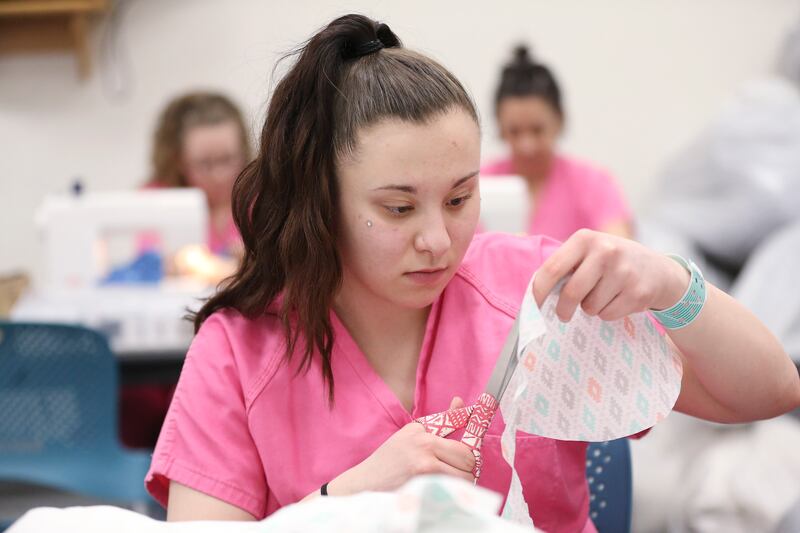SPANISH FORK — When they heard a shortage of face masks might only get more dire, eight women in Utah County got to work.
Three sewing machines now hum for six hours a day in their shop, churning out more than 100 of the coverings in each session. As one in the group irons, others cut out patterns while a trio pushes cloth and elastic under bobbing needles.
Judas Priest songs at low volume and a supply of Diet Coke and cookies keep spirits and production up.
The Utah women have joined a nationwide sewing force seeking to curb the spread of coronavirus. And like a growing number of inmates from Delaware to California — plus more in the Utah State Prison — they are chipping in from behind bars.
They’re assembling reusable masks in vibrant hues, like a pink that matches their Utah County Jail uniforms.
“I’ve never touched a sewing machine in my life until now,” said inmate Mykin Broadbent. “It feels good to be able to help.”
Broadbent said she and the seven other mask-makers didn’t hesitate last week when Undersheriff Shaun Bufton asked if they wanted to help create protective gear for fellow inmates, officers and even suspects.
While the jail now has N95 and surgical masks on hand, the pandemic may outlast its supply, Bufton said.
“Making these makes us self-sufficient,” he said Wednesday.
Bufton had run the idea by his wife, Christi Bufton, an expert sewer who jumped into action, crafting a pattern and a prototype within minutes. Bufton now dispatches a lieutenant for regular runs to the fabric store, where supply is running low.
“Some of the stuff he bought today looks like your grandma’s drapes, but it’ll do,” Bufton said. He acknowledged he had not yet taken a turn at the sewing machine.
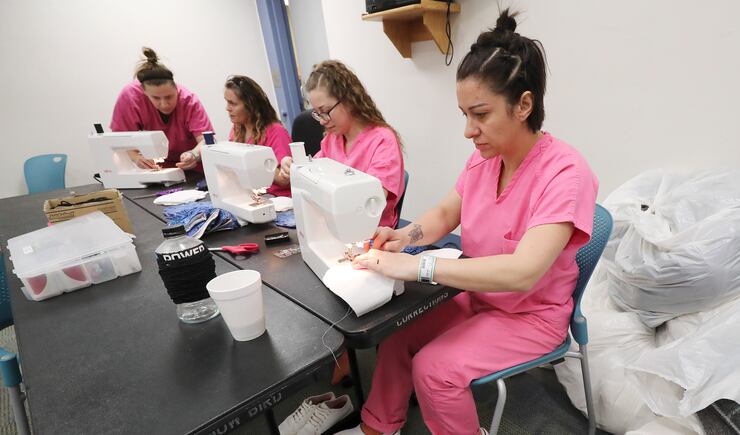
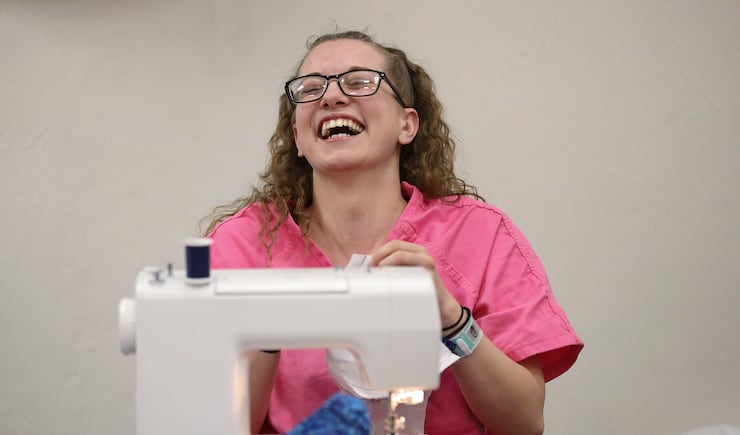
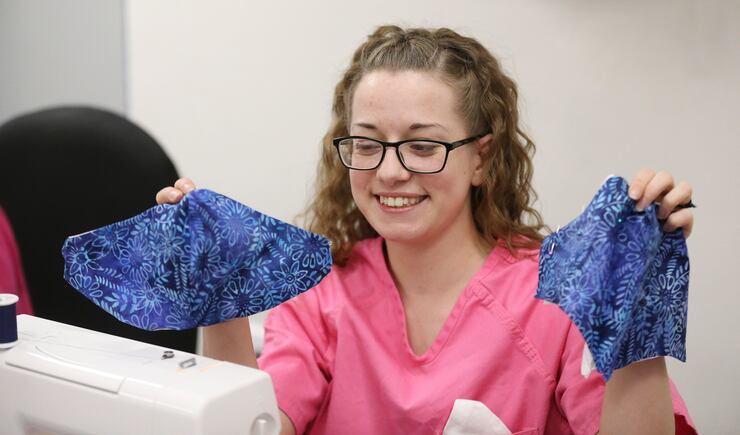

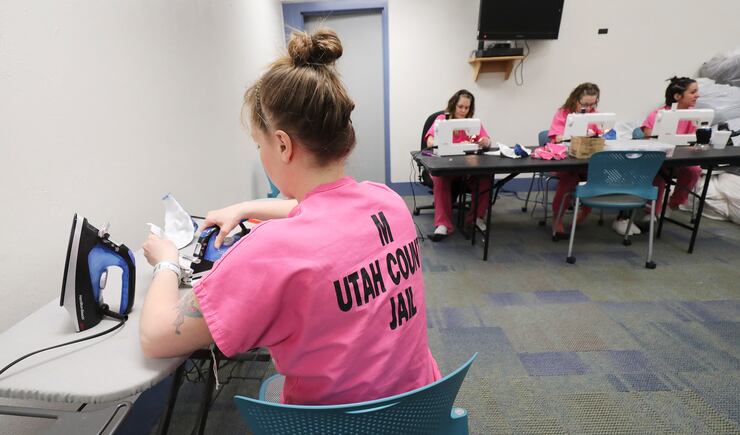
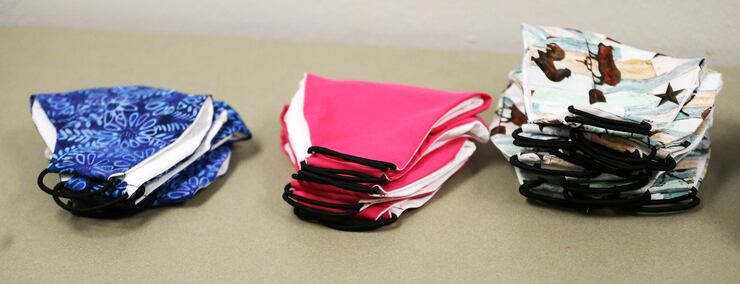
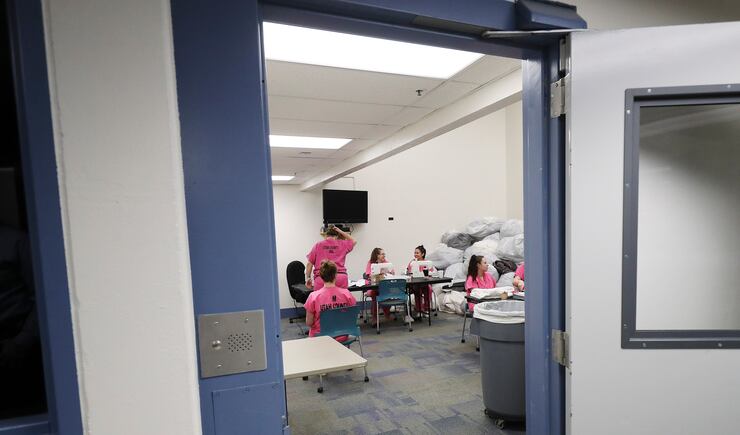
The eight women are in a special program designed to make their transition to life on the outside as seamless as possible. They are required to cook or clean at the jail, undergo counseling and take classes that range from budgeting to gardening.
“They are working very hard,” Bufton said. “Right now, everybody’s in a dark place. And these inmates in the jail, they’re worried. They have family at home. This is a way for us to just kind of help out.”
The 40-year-old Broadbent is being held on an alleged probation violation after a DUI two years ago. She said she sees the new endeavor as one more addition to a new skill set that will help her stay sober and move forward. Plus, it’s a way to pass the time, she added.
Although the women don’t earn any pay for the hours they work in the converted storage room, it can chip away at court-ordered community service hours. And they take care to observe social distancing to the extent possible in their makeshift workshop.
“We have a good time,” Broadbent said, showing off masks in pink, bright blue and another with a horse print. “Not to say that jail’s actually fun.”
Tallyn Allred said she and other inmates have assembled to-go meals and bags for senior citizens in the county filled with items like toilet paper, soap and hand sanitizer, so the masks were a natural next step.
“People out there need the help,” said Allred, who is 22 and serving a short sentence on drug possession charges.
One hundred men at the Utah State Prison’s Gunnison site are also racing to meet the need.
Since they began April 6, they have assembled 38,000 of the same product in white and gray.
The protective wear is not just for use in the prison. It’s also going to hospitals and state agencies, said Jesse Gettler, the corrections production manager overseeing the effort. The inmates — each equipped with their own two masks — are at work stitching from 6 a.m. to 8 p.m. on weekdays and until 4 p.m. on weekends. Hourly pay remains at about $1.30.
“We asked everybody to step up and work long days,” Gettler said. “Not one of them had an issue with it.”
Michael Kitteridge, an inmate helping to manage the project, said he and others who work in the prison’s sewing shop have long taken pride in stitching pillows for use in the prison and other items for use outside its walls.
“This is a bigger cause than just building something for a company. This is building something for the world, for a crisis, and it feels good,” said Kitteridge, who has served more than 20 years for sexual assault and burglary.
“I’m hoping to be out of here pretty soon, and it makes me feel like I’m transitioning myself back out there, and I’m helping the community I’m going to one day be a part of again,” he said. “I know a lot of people feel the same way.”
Jails and prisons are seen as prone to outbreaks of the potentially deadly virus due to the close quarters. And in Salt Lake County, several inmates have tested positive for COVID-19. The prison is no longer accepting offenders recently housed there.
In Utah County, however, Broadbent and Allred said they feel employees and officers are doing a good job of keeping them safe, conducting thorough screenings of new inmates and isolating any who display symptoms like a cough or fever.
Broadbent said her attorney offered to ask for her release now so she could serve her time at a later date, but she opted to get it over with. She said she’s more worried about the safety of her elderly grandparents than her own, and speaks with them often by phone.
Both she and Allred hope batches of their product will wind up in the hands of hospital workers, older people and anyone else who could use them. They said they’ll continue to help for as long as they’re needed.
“We’ll stop when it’s over,” Broadbent said.

